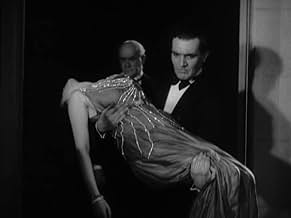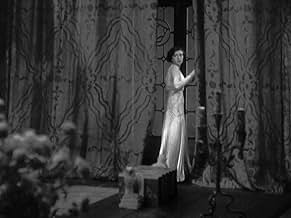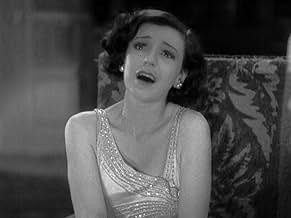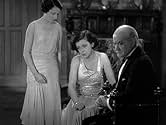IMDb-BEWERTUNG
5,7/10
3829
IHRE BEWERTUNG
Eine traditionell lebende Familie und eine moderne Familie kämpfen in einem kleinen englischen Dorf um Land und zerstören sich fast gegenseitig.Eine traditionell lebende Familie und eine moderne Familie kämpfen in einem kleinen englischen Dorf um Land und zerstören sich fast gegenseitig.Eine traditionell lebende Familie und eine moderne Familie kämpfen in einem kleinen englischen Dorf um Land und zerstören sich fast gegenseitig.
- Regie
- Drehbuch
- Hauptbesetzung
Rodney Ackland
- Man at Auction
- (Nicht genannt)
Ivor Barnard
- Man at Auction
- (Nicht genannt)
Wally Patch
- Van Driver
- (Nicht genannt)
Empfohlene Bewertungen
"The Skin Game" is not exactly classic Hitchcock-- no one could dispute that. But I still think it does not entirely deserve its bad ratings. There are a few--not too many, but a few-- interesting scenes and surprises. The characters are fairly sympathetic and well-drawn.
I think the fault of "The Skin Game" lies not in the fact that it is a stage-bound play-- Hitchcock worked wonders on screen with stage-bound plays, notably "Rope" and "Dial M for Murder". Perhaps it is that the emotions of the characters are not focused upon-- the camera keeps rather too distant. If the tone were more personal in this film, the performers might have a better chance to hold our interest.
If you are looking for entertainment and stimulation that one can normally find in a Hitchcock-- better to look somewhere else.
I think the fault of "The Skin Game" lies not in the fact that it is a stage-bound play-- Hitchcock worked wonders on screen with stage-bound plays, notably "Rope" and "Dial M for Murder". Perhaps it is that the emotions of the characters are not focused upon-- the camera keeps rather too distant. If the tone were more personal in this film, the performers might have a better chance to hold our interest.
If you are looking for entertainment and stimulation that one can normally find in a Hitchcock-- better to look somewhere else.
I recently saw Hitchcock's "Rich and Strange" and really enjoyed it, so I was game for another go at this early 1930's British cinema, in my attempt to become a "Hitchcock completist." Please keep in mind that I'm an American with a pretty-good ear for British dialog, but there are some speeches contained here that I couldn't understand in the least. But only a fairly small portion that is. The early sound equipment doesn't help either.
The title "The Skin Game" refers to a heated altercation that leaves no holds barred, and no prisoners taken. The plot line is essentially a "Hatfields and McCoys" family feud over land rights, with a lot of dirt being dug up on both families involved. Like pretty much all early sound films, there is a heavy reliance on dialog and the spoken phrase, which makes "The Skin Game" obviously derived from the stage.
At the beginning there's a long take with probably ten pages of dialog in it, using a medium shot of three characters, with the camera panning between them. At least once, someone was speaking dialog while not on camera, which I always find distracting -- a minor flaw I admit, but noticeable. Hitchcock's pacing feels relatively quick considering, and he keeps interest in these scenes with dramatic exits and entrances of characters, and revelations of plot details.
Really some of these takes were so long that actors coughed, dropped things and retrieved them, and other apparent flubs that were never re-shot. Seems like once the director was five minutes into a scene he couldn't afford the film stock to begin again, so there are a lot of miscues and such, which kind of adds to the immediacy. Especially considering that I'm certain that even the young Hitchcock was keenly aware of every missed cue and dropped line, and it had to drive him to distraction! I was certainly impressed by this early Hitchcock effort and I'm sure that audiences back then went away from this one with the feeling that they got their money's worth. It was apparent that an extremely talented film maker was at work here, trying to keep the audience involved every step of the way. And he did succeed actually.
For instance, there is a scene at an auction house that lasts for about ten minutes, and Hitchcock sets it up in such a way to keep the audience anxiously awaiting the outcome. He has the camera making very fast pans from one bidder to the next, slowing down only when the bidding does. The audience has some background information about the proceedings, but not enough to spoil the surprise at the end.
It's early sound cinema -- so most viewers today can't bear this kind of thing, but if you're familiar with and enjoy films of the early 20Th Century, it's extremely enjoyable and does have a payoff at the end! *** out of *****
The title "The Skin Game" refers to a heated altercation that leaves no holds barred, and no prisoners taken. The plot line is essentially a "Hatfields and McCoys" family feud over land rights, with a lot of dirt being dug up on both families involved. Like pretty much all early sound films, there is a heavy reliance on dialog and the spoken phrase, which makes "The Skin Game" obviously derived from the stage.
At the beginning there's a long take with probably ten pages of dialog in it, using a medium shot of three characters, with the camera panning between them. At least once, someone was speaking dialog while not on camera, which I always find distracting -- a minor flaw I admit, but noticeable. Hitchcock's pacing feels relatively quick considering, and he keeps interest in these scenes with dramatic exits and entrances of characters, and revelations of plot details.
Really some of these takes were so long that actors coughed, dropped things and retrieved them, and other apparent flubs that were never re-shot. Seems like once the director was five minutes into a scene he couldn't afford the film stock to begin again, so there are a lot of miscues and such, which kind of adds to the immediacy. Especially considering that I'm certain that even the young Hitchcock was keenly aware of every missed cue and dropped line, and it had to drive him to distraction! I was certainly impressed by this early Hitchcock effort and I'm sure that audiences back then went away from this one with the feeling that they got their money's worth. It was apparent that an extremely talented film maker was at work here, trying to keep the audience involved every step of the way. And he did succeed actually.
For instance, there is a scene at an auction house that lasts for about ten minutes, and Hitchcock sets it up in such a way to keep the audience anxiously awaiting the outcome. He has the camera making very fast pans from one bidder to the next, slowing down only when the bidding does. The audience has some background information about the proceedings, but not enough to spoil the surprise at the end.
It's early sound cinema -- so most viewers today can't bear this kind of thing, but if you're familiar with and enjoy films of the early 20Th Century, it's extremely enjoyable and does have a payoff at the end! *** out of *****
Fine and interesting story from the play of the same name adapted by Alfred Hitchcock himself and his wife and usual writer Alma Reville . Dealing with two British families : the aristocratic Hillcrist family, and Hornblower family headed by proud and ambitious Mr. Hornblower : Edmund Gwenn , both of them feud over land rights . As the latter , the mercilessly pushy Mister Hornblower sends away and evicts poor farmers to build factories on their lands . After that , Mr. Hornblower outwits Hillcrist in an auction for an additional piece of area property , the wealthy Hillcrists find their big estate completely surrounded by the upstart Hornblower . Things go wrong when Mrs. Hillcrest settles a terrible secret about a dark past of the Hornblower family .
It isn't thrilling , neither suspenseful , non characteristic of working with Hitchcock , but a tumultuous and strong drama . Way too much talking in excruciating , long and drawn-out scenes . This is a brooding drama whose premise turns out to be the hard confrontation between a rich family , the Hillcrests , fighting against the speculator who attempts to make a chimneyed factory complex , Hornblower , then emerges a dark secret resulting in tragic consequences , as it is used as a blackmail againts the speculator and force him to stop doing business . Performances are uniformly good , though in an excessive theatrical style . Based on a successfyl play and still stunningly hypnotic to see today . In fact , being , nowadays ,more stimulating for its innovations in that area , and by experimenting with a peculiar narrative structure . This fine early effort by Hitch has several novelties , as the movie transcends the limitation of its dramatic plot by dealing with thought-provoking issues and focusing on the theatrical meditations of reality . Here Alfred gives a few signs to be an expertise at tightening tension that was already building up . Main known actor results to be Edmund Gwen , giving a nice acting as the nouveau riche, social climber Mr. Hornblower who buys a lot of property abutting their state. Along with other notorious but unknown actors such as : Jill Esmond , Helen Haye , Phyllis Konstam, John Longden, Frank Lawton , C. V. France , Herbert Ross , among others .
This early talkie motion picture was well realized by the famous Alfred Hitchcock and made in his previous British period . His first sound film for Great Britain was ¨Blackmail¨, being made as a silent movie , this one was really an early talkie . This film ¨Skin Game¨1931 belongs to Hitch's first British epoch when he directed silent films, such as ¨The lodger¨ (1926) , ¨The ring¨(1927) , ¨Easy virtue¨ (1927) , ¨The Manxman¨(29) ; being ¨Blackmail¨(29) made as a silent , this was reworked to become a talkie . Following sound movies and early talkies as ¨Murder¨(1930 , ¨June and the Paycock¨(30) , ¨Rich and strange¨(32) , ¨Number 17¨(32) , ¨The man who knew too much¨(34) , ¨The 39 steps¨ (35) , ¨The secret agent¨(36) , ¨Sabotage¨(36) , ¨The lady vanishes¨(38) , ¨Jamaica Inn¨ (39) until he is hired by David O'Selznick to shoot¨Rebecca¨(40) in the US and continuing with other popular movies and masterpieces with world successes .
It isn't thrilling , neither suspenseful , non characteristic of working with Hitchcock , but a tumultuous and strong drama . Way too much talking in excruciating , long and drawn-out scenes . This is a brooding drama whose premise turns out to be the hard confrontation between a rich family , the Hillcrests , fighting against the speculator who attempts to make a chimneyed factory complex , Hornblower , then emerges a dark secret resulting in tragic consequences , as it is used as a blackmail againts the speculator and force him to stop doing business . Performances are uniformly good , though in an excessive theatrical style . Based on a successfyl play and still stunningly hypnotic to see today . In fact , being , nowadays ,more stimulating for its innovations in that area , and by experimenting with a peculiar narrative structure . This fine early effort by Hitch has several novelties , as the movie transcends the limitation of its dramatic plot by dealing with thought-provoking issues and focusing on the theatrical meditations of reality . Here Alfred gives a few signs to be an expertise at tightening tension that was already building up . Main known actor results to be Edmund Gwen , giving a nice acting as the nouveau riche, social climber Mr. Hornblower who buys a lot of property abutting their state. Along with other notorious but unknown actors such as : Jill Esmond , Helen Haye , Phyllis Konstam, John Longden, Frank Lawton , C. V. France , Herbert Ross , among others .
This early talkie motion picture was well realized by the famous Alfred Hitchcock and made in his previous British period . His first sound film for Great Britain was ¨Blackmail¨, being made as a silent movie , this one was really an early talkie . This film ¨Skin Game¨1931 belongs to Hitch's first British epoch when he directed silent films, such as ¨The lodger¨ (1926) , ¨The ring¨(1927) , ¨Easy virtue¨ (1927) , ¨The Manxman¨(29) ; being ¨Blackmail¨(29) made as a silent , this was reworked to become a talkie . Following sound movies and early talkies as ¨Murder¨(1930 , ¨June and the Paycock¨(30) , ¨Rich and strange¨(32) , ¨Number 17¨(32) , ¨The man who knew too much¨(34) , ¨The 39 steps¨ (35) , ¨The secret agent¨(36) , ¨Sabotage¨(36) , ¨The lady vanishes¨(38) , ¨Jamaica Inn¨ (39) until he is hired by David O'Selznick to shoot¨Rebecca¨(40) in the US and continuing with other popular movies and masterpieces with world successes .
I feel many writers and critics, David Sterritt, Donald Spoto to name but two are too dismissive of this movie. With the technological restrictions of the very early talkie, Hitchcock as used his artistry to compose fluidity and cinematic suture to a rather stolid Galsworthy play. Already mentioned are the innovative zip pans, he also has intelligent use of dissolve, symbolism aplenty within montage sequences, sheep v horn (Hillcrest v Hornblower). The juxtaposition in the opening sequence of the car and the horse sets the theme beautifully. Occasionally there is daring reverse shots of the same objects defying the 180 degree rule, especially noticeable as we break into the proscenium arch of theatre.
Technical crudities, print/sound deficiencies and dated acting styles taken into consideration, "Skin Game" still has innovative (for the time) camera techniques and thematic ambiguity (who is right and who is wrong? Who are the true villains of the story?) and is generally better than other, more "typical" Hitchcock films of the period, like "Murder!" from 1930.Edmund Gwenn is terrific and Phyllis Constam is quite sexy. (**1/2)
Wusstest du schon
- WissenswertesThe title comes from a slang phrase for "an unscrupulous business operation". Although this movie is British, the term is considered American and dates back to just after the American Civil War (1861-1865). It is not to be confused with the similar-sounding aphorism "to have skin in the game", which refers to someone who has a stake, financial or emotional, in a business deal, wager, or other situation.
- Zitate
[last lines]
Mr. Hillcrist: What is it that gets loose when you start a fight, and makes you what you think you're not? Begin as you may, it ends in this skin game! Skin game! When we began this fight, we'd clean hands. Are they clean now? What's gentility worth if it can't stand fire?
- VerbindungenFeatured in Paul Merton Looks at Alfred Hitchcock (2009)
- SoundtracksHabanera
(1875) (uncredited)
from "Carmen"
Music by Georges Bizet
Libretto by Henri Meilhac and Ludovic Halévy
Excerpt whistled by Jill Esmond
Top-Auswahl
Melde dich zum Bewerten an und greife auf die Watchlist für personalisierte Empfehlungen zu.
Details
- Erscheinungsdatum
- Herkunftsland
- Sprache
- Auch bekannt als
- The Skin Game
- Drehorte
- Elstree Studios, Borehamwood, Hertfordshire, England, Vereinigtes Königreich(Studio, destroyed during World War II and later rebuilt)
- Produktionsfirma
- Weitere beteiligte Unternehmen bei IMDbPro anzeigen
- Laufzeit1 Stunde 25 Minuten
- Farbe
Zu dieser Seite beitragen
Bearbeitung vorschlagen oder fehlenden Inhalt hinzufügen

































